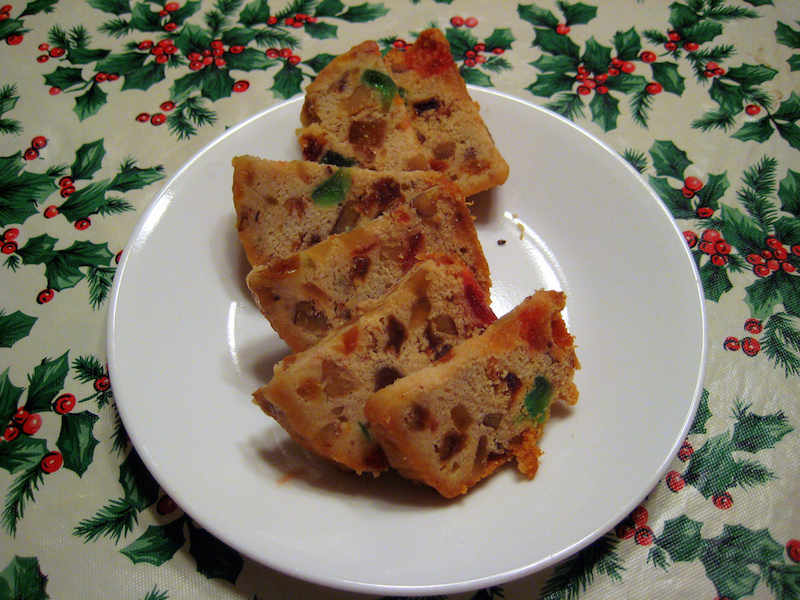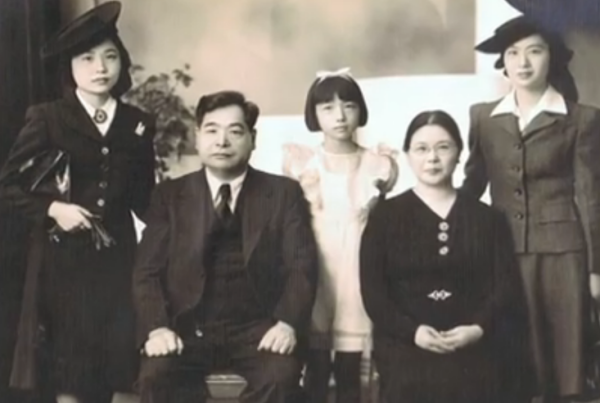It’s the holiday season, and for some of us that means buying, selling, or eating fruitcake. Whether you like it or not. Turns out there’s a bakery in Corsicana that churns out one million fruitcakes a year. Despite the bruised reputation of the traditional treat, the Collin Street Bakery‘s deluxe fruitcake sells worldwide.
In the 1940s, a German immigrant and a Texas businessman gave up baking bread for baking fruitcake. If you think that’s nuts, you should try it.
“It’s about 30 percent pecans,” he says. “We use about 20,000 pounds of pecans a day during the season.”
That’s a truckload of pecans every other day. Hayden Crawford is a partner at Collin Street Bakery, which was founded in 1896. This afternoon he’s two-stepping in his lizard skin boots around giant mixers and boxes of dried fruit.
“Here’s the golden Sultana raisins,” he says. The golden Sultana raisin, bright red cherries, green pineapple and papaya are bound together by a batter of flour and honey, mixed by big metal claws and hand-decorated by women in hairnets. They churn out up to 20,000 a day this time of year.
The deluxe fruitcake has made Collin Street Bakery famous worldwide. Early on, circus showman John Ringling started sending the treat to friends abroad. In the 70s, the red metal tin even shows up in a scene from “The Godfather.” Sales in the U.S. started to wane for the first time about 15 years ago. Crawford says some people didn’t want to buy a cake that looked like a box of Skittles. So the bakery added to its repertoire.
“We have an apricot from Australia, we have an apple cinnamon,” he says, “and we have what we call the ‘Texas blonde.’ Instead of the red and green fruit, we just use pecans on the top.”
Crawford says the fruitcake makeover also include a name change. “Instead of calling them fruitcakes, we started calling them ‘pecan cakes.’ And that changed pretty dramatically the sales for our cakes.”
Even with the name change and free samples in each store, not every customer is convinced. Alma Garcia won’t eat the fruitcake.
“It’s just so sweet,” she says. “I don’t like it.” She opts for the cheesecake, which might hit the spot but it probably won’t last as long as the famous fruitcake.
Or is that just a myth?
Today we plan to put to rest the old quip that there’s only one fruitcake in the world, shipped from person to person. Here to help dispel that and other fruitcake rumors is Nancie McDermott, a North Carolina-based cooking teacher and author of Southern Cakes: Sweet and Irresistible Recipes for Everyday Celebrations.
“Fruitcake is a British gift,” she says. “Fruitcake is really just a variation on the pound cake, which I think everybody loves.”
McDermott says the rumor that fruitcakes last forever is really a question of whether you can freeze it.
“Yes, you can freeze anything,” she says. “The question is, Will it still be good? [Traditionally] people would keep them for months.”
There used to be a “stir-up Sunday” on the last weekend in November, which McDermott says would be the start of the fruitcake season.
“People would make the cakes and then season them and cure them with blackberry cordial or rum or brandy,” she says. “They would keep them in tins and slice off a little bit throughout the holiday season. It was a whole lot of work to make them… so it was the kind of holiday treat to get finished and turn to when you were ready.”
The key ingredient, given the name, has always been fruit: both dried – raisins, prunes, dates – and candied fruits. Unlike traditional British cakes, the Southern recipes often use less molasses, so they’re lighter in color, and call for allspice, from Jamaica, and the native pecan, instead of English walnuts.
Listen to the full story and interview in the audio player.














